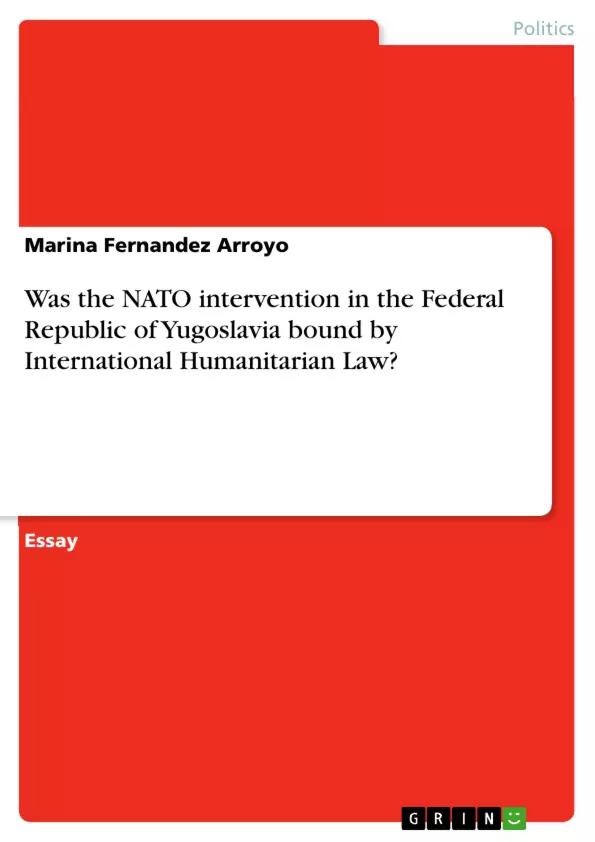During the armed conflict of non-international character between the Federal Republic of Yugoslavia (FRY) and the Kosovo Liberation Army (UCK), the intervention of NATO against the FRY supposed the internationalization of the conflict for all the parties. NATO decided to intervene in this conflict against the forces of the FRY arguing that they were neither supporters of the UCK, nor against Serbia. Indeed, they stated that their operations were in order to prevent a “humanitarian catastrophe”. Even if they used this label and stressed that they were not making war, their intervention was later on traduced in military operations based mainly on air attacks. The Security Council never authorized this intervention. Besides, NATO was accused in many occasions of nonrespecting the rules of International Humanitarian Law (Hereinafter “IHL”).
The present paper will discuss the following questions: What is the legal status of NATO? What IHL instrument is NATO bound by as an organization? What are the IHL obligations of States when acting on behalf of NATO? How do NATO and States conjugate their different obligations under IHL during their interventions? How to make accountability for IHL breaches committed by NATO and the Allies?
Inhaltsverzeichnis (Table of Contents)
- The Legal Status of NATO
- IHL Obligations of NATO and its Member States
- Accountability for IHL Breaches
Zielsetzung und Themenschwerpunkte (Objectives and Key Themes)
This paper examines the legal obligations of NATO and its member states under international humanitarian law (IHL) during military interventions. It explores the legal status of NATO, its binding IHL instruments, and the different obligations of states when acting on behalf of NATO. The paper also investigates the challenges of enforcing accountability for IHL breaches committed by NATO and its allies.
- The legal status of NATO in international law
- The applicability of IHL to NATO and its member states
- The challenges of reconciling different IHL obligations among NATO members
- The issue of accountability for IHL violations committed by NATO and its allies
- The role of national caveats in NATO operations
Zusammenfassung der Kapitel (Chapter Summaries)
- The Legal Status of NATO: This chapter examines the legal personality of NATO and its binding IHL instruments. It argues that NATO, as an organization, is bound by customary IHL, although it is not a signatory to the Geneva Conventions or their additional protocols. The chapter further discusses the legal obligations of NATO member states, highlighting the challenges of reconciling their different IHL obligations when acting on behalf of NATO.
- IHL Obligations of NATO and its Member States: This chapter explores the different legal obligations of NATO member states under IHL, emphasizing the fact that they do not lose or gain rights and obligations when operating together with other states. It discusses the challenges of ensuring that all member states are fulfilling their legal obligations during NATO operations, particularly in light of the possibility of national caveats.
- Accountability for IHL Breaches: This chapter examines the challenges of holding NATO and its member states accountable for IHL violations. It discusses the difficulties of identifying which state is responsible for specific violations during NATO operations, and the limitations of international courts in prosecuting NATO.
Schlüsselwörter (Keywords)
This paper focuses on the legal framework surrounding NATO interventions, particularly in the context of international humanitarian law. Key themes include: international legal personality, customary IHL, obligations of states, national caveats, accountability for IHL violations, and the challenges of enforcing IHL in multinational operations.
Frequently Asked Questions
Is NATO bound by the Geneva Conventions?
While NATO as an organization is not a signatory to the Geneva Conventions, it is bound by customary International Humanitarian Law (IHL).
What are "national caveats" in NATO operations?
National caveats are restrictions placed by individual member states on how their forces can be used, which can complicate the uniform application of IHL.
How is accountability handled for IHL breaches by NATO?
Accountability is challenging because it is often difficult to identify which specific state is responsible for a violation during a multinational intervention.
Did the Security Council authorize the NATO intervention in Yugoslavia?
No, the Security Council never officially authorized the intervention, leading to significant legal debate over its legitimacy.
Do member states lose their IHL obligations when acting for NATO?
No, sovereign states retain their individual legal obligations under IHL even when operating as part of the NATO alliance.
- Quote paper
- Marina Fernandez Arroyo (Author), 2016, Was the NATO intervention in the Federal Republic of Yugoslavia bound by International Humanitarian Law?, Munich, GRIN Verlag, https://www.grin.com/document/354408



